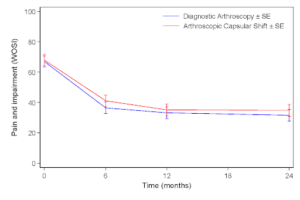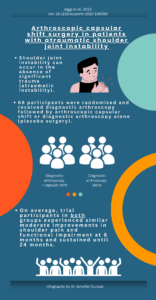Keywords: shoulder instability: capsular shift; randomised clinical trial
Why is this study important?
Shoulder (glenohumeral) joint instability can occur in the absence of significant trauma (atraumatic instability) and may significantly impact physical, social and mental wellbeing. It is often managed with physical therapy but, if physical therapy fails to prevent recurrent dislocation, pain or impaired function, shoulder stabilisation surgery is a treatment option. However, there have been no randomised trials of any surgical interventions for atraumatic shoulder joint instability, so the effectiveness of surgery is not known with any certainty. This blog summarizes novel research exploring this topic further (1).
How did the study go about this?
We conducted a randomised, placebo-controlled clinical trial in a specialist secondary care facility to determine the effect of arthroscopic capsular shift surgery on pain and functional impairment for people with atraumatic shoulder joint instability. Patients aged 18 years and over who reported insecurity (apprehension) in their shoulder joint and had evidence of capsulolabral damage on arthroscopic examination were included. Patients were excluded if their shoulder apprehension symptoms were precipitated by a high velocity shoulder injury, they had bony or neural damage, a rotator cuff or labral tear, or previous surgery on the symptomatic shoulder. Sixty-eight participants were randomised and received diagnostic arthroscopy followed by arthroscopic capsular shift or diagnostic arthroscopy alone (placebo surgery). Participants were not aware of which surgical procedures were performed and they all received the same post-operative clinical care from physiotherapy staff, who were also blind to whether they had received the arthroscopic capsular shift procedure. The primary outcome was pain and functional impairment measured with the Western Ontario Shoulder Instability Index (WOSI).
What did the study find?
On average, trial participants in both the arthroscopic capsular shift and the diagnostic arthroscopy groups experienced similar moderate improvements in shoulder pain and functional impairment at 6 months as measured by the WOSI scale and these improvements were sustained until 24 months (Figure 1).

Figure 1: Shoulder pain and impairment over 24 months in both groups
What are the key take-home points?
In this study single centre of arthroscopic inferior capsular shift for atraumatic structural shoulder instability, the surgery conferred no additional short to medium term improvement in pain or functional impairment when compared to diagnostic arthroscopy with the same structured rehabilitation protocol.

References:
- Jaggi A, Herbert RD, Alexander S, et al Arthroscopic capsular shift surgery in patients with atraumatic shoulder joint instability: a randomised, placebo-controlled trial British Journal of Sports Medicine Published Online First: 12 June 2023. doi: 10.1136/bjsports-2022-106596
Authors:
-Anju Jaggi (Therapies Dept, Royal National Orthopaedic Hospital, Brockley Hill, Stanmore UK Consultant Physiotherapist)
-Robert D Herbert (Neuroscience Research Australia (NeuRA), 139 Barker St, Randwick NSW Australia 2031 Senior Principal Research Scientist)
-Susan Alexander (Fortius Clinic17 Fitzhardinge Street, W1H 6EQ UK Consultant Orthopaedic Shoulder Surgeon)
-Addie Majed (Royal National Orthopaedic Hospital, Brockley Hill, Stanmore UK Consultant Shoulder & Elbow Surgeon)
-David Butt (Royal National Orthopaedic Hospital, Brockley Hill, Stanmore UK Consultant Shoulder & Elbow Surgeon)
-Deborah Higgs (Royal National Orthopaedic Hospital, Brockley Hill, Stanmore UK Consultant Shoulder & Elbow Surgeon)
-Will Rudge (Royal National Orthopaedic Hospital, Brockley Hill, Stanmore UK Consultant Shoulder & Elbow Surgeon)
-Karen A Ginn (The University of Sydney NSW Australia 2006 Research Affiliate)